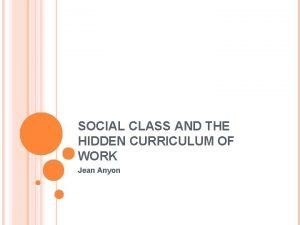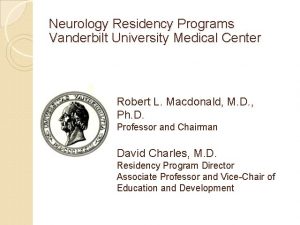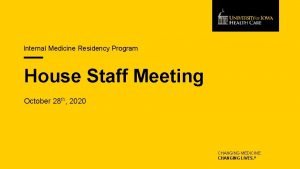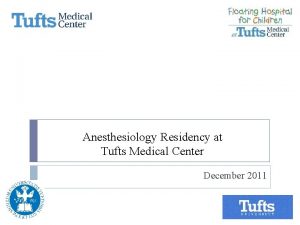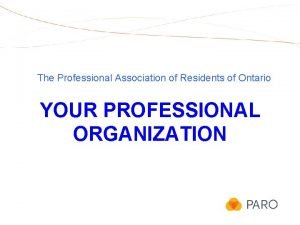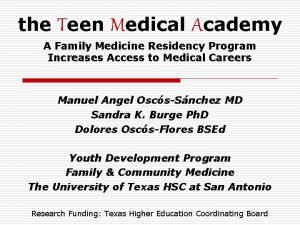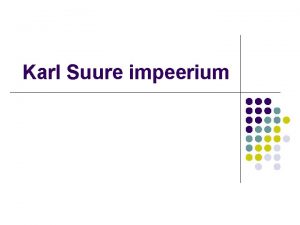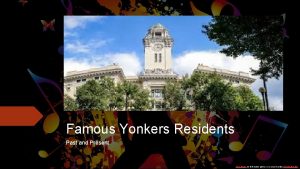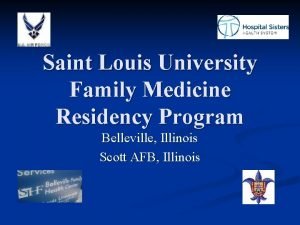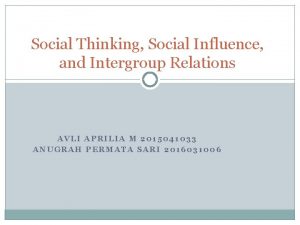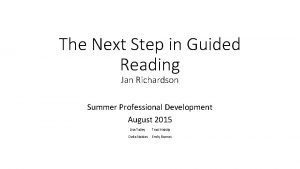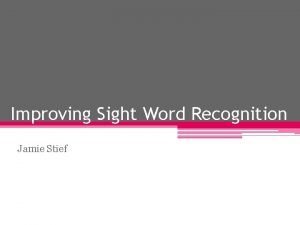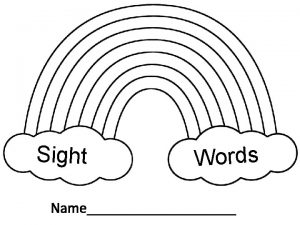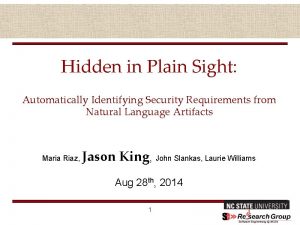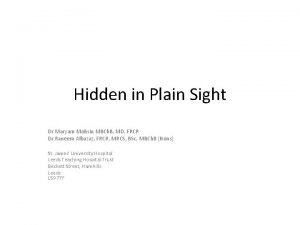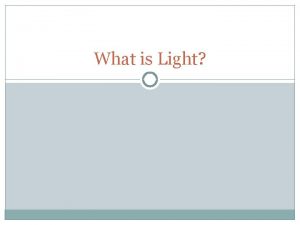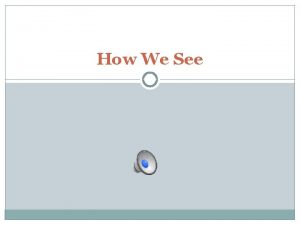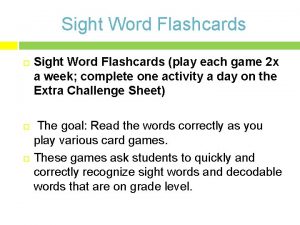Hidden In Plain Sight Social Support of Residents








































- Slides: 40

Hidden In Plain Sight: Social Support of Residents by Residency Coordinators in Family Medicine William J. Mc. Cann, Psy. D Mark Knudson, MD, MPH Mary Locke Mark Andrews, MD Department of Family & Community Medicine

Objectives n Briefly discuss the nature & impact of social support n Review the sources of social support in Family Medicine Residency programs n Present the data from the national survey of Residency Coordinators’ social support activities n Discuss the possible implications of these data for residency coordinators and residency programs

Social Support is. . . the existence or availability of people on whom we can rely, people who let us know that they care about, value, and like us.

Three types of social support Antonucci, 1985; House & Kahn, 1985; Kahn & Antonucci, 1980). n Emotional n n Informational n n Verbal and nonverbal communication of caring and concern The provision of information used to guide or advise Instrumental n The provision of material goods (e. g. , transportation, money, or physical assistance)

Table 1 Sample Social Support Questionnaire (SSQ) Items 1. Whom can you really count on to listen to you when you need to talk? 2. Whom could you really count on to help you out in a crisis situation, even though they would have to go out of their way to do so? 3. Whom can you really count on to be dependable when you need help? 4. With whom can you totally be yourself? 5. Who do you feel really appreciates you as a person? 6. Whom can you count on to console you when you are very upset? Sarason, et al, Journal of Personality and Social Psychology, 1983, Vol. 44, No. 1, 127 -139

Inventory of Socially Supportive Behaviors (ISSB) Barrera, M. J. & Ainlay, S. L. (1983). The structure of social support: A conceptual and empirical analysis. Journal of Community Psychology, 11, 133 -143 2. Was right there with you (physically) in a stressful situation. 5. Told you what she/he did in a situation that was similar to yours. 7. Talked with you about some interests of yours. 8. Let you know that you did something well. 11. Told you that she/he would keep the things that you talk about private-just between the two of you. 13. Made it clear what was expected of you. 15. Gave you some information on how to do something. 16. Suggested some action that you should take.

Inventory of Socially Supportive Behaviors (ISSB) Barrera, M. J. & Ainlay, S. L. (1983). The structure of social support: A conceptual and empirical analysis. Journal of Community Psychology, 11, 133 -143 19. Gave you some information to help you understand a situation you were in. 21. Checked back with you to see if you followed the advice you were given. 23. Helped you understand why you didn't do something well. 24. Listened to you talk about your private feelings. 26. Agreed that what you wanted to do was right. 27. Said things that made your situation clearer and easier to understand. 28. Told you how he/she felt in a situation that was similar to yours. 29. Let you know that he/she will always be around if you need assistance.

Inventory of Socially Supportive Behaviors (ISSB) Barrera, M. J. & Ainlay, S. L. (1983). The structure of social support: A conceptual and empirical analysis. Journal of Community Psychology, 11, 133 -143 30. Expressed interest and concern in your well-being. 32. Told you who you should see for assistance. 33. Told you what to expect in a situation that was about to happen. 35. Taught you how to do something. 36. Gave you feedback on how you were doing without saying it was good or bad. 37. Joked and kidded to try to cheer you up. 40. Loaned you under $25.

Studies have repeatedly demonstrated a link between low levels of social support and poor mental and physical health outcomes. Hogan, BE, Linden W, Najarian B. Social support interventions: Do they work? Clinical Psychology Review 22 (2002) 381 -440.

Social Support interventions: Do they work? Hogan, Linden, Najarian (2002). Clinical Psychology Review, 22, 381 -440. Presence of [social] support has repeatedly been linked to good long-term health outcomes based on demonstrations of better immune function, lower blood pressures, and reduced mortality.

International Graduate Students, Stress, and Social Support Mallinckrodt, B. & Leong, F. T. L. (1992) J of College Student Development, 33, 71 -78. The quality of the social support system had not only a direct but also a buffering effect when international students were undergoing psychological stress. These authors concluded that social support, especially from one’s academic program, is essential to the welfare of international students.

The ACGME requirements: ü Attend to physician well-being and the prevention of impairment by supplying group support ü Monitoring resident stress, including mental or emotional conditions inhibiting performance or learning. ü Provide confidential counseling and psychological support services to residents. Accreditation Council for Graduate Medical Education. Family practice program requirements. www. acgme. org. Accessed March 17, 2008.

List of Psychosocial Support Services Addison, Riesenberg, Rosenbaum. Fam Med 2004; 36(2): 108 -13. n Seminars/speakers stress 99 n Formal gripe sessions 95 n Faculty advisors 94 n Social activities 94 n Support groups 80 n Counselors available 79 n Balint groups 69 n Retreats 69 n Financial advisor 63 n Support for resident/significant others 18 n Support for significant others 16

Ratings of 57 Interns of the Importance of 17 Types of Support Matthews et al, 1988, J of Med Ed, 63, July. n Vacations and/or time off-call n Exercise n Fellow interns n Friends outside of medicine n Spouse or lover n Faculty members n Self-understanding n n Recreational activities Professional activities (reading, conferences) n Residents n Religion n Patient experiences n Alcohol n Personal & Professional Development Programs n Professional counseling n Drugs (other than alcohol) n Family members (not spouse or lover)

The Survey Development n Developed questions based on observation of RC’s activities in multiple programs and several RCs n Reviewed with our residency administration and faculty n Had survey reviewed by our research faculty n Had 11 RC’s complete the survey at the National Coordinator’s meeting

The Survey - Population n Surveys Mailed: 459 n Returned: 316 (69%) n How long have you been the Residency Coordinator? n Average: 8. 8 years n Age: Average = 46 n Gender: F n How many residents are in your program? 95% Average: 22 M 5% Range: 2 - 72

Question 1: How often do the residents talk to you about. . . Item % Responding “Regularly or “Very Frequently” Daily Events 73% General problems in residency 73% Their personal life 54% Interpersonal problems in the residency 44% Their personal problems 32% Finding help for professional problems 27% Finding help for personal problems 17% Other 3%

How often do residents talk to you about. . . Comments? n I am a general sounding board. n Just venting about almost everything! n Like their second Mom. n They pretty much tell me everything!

Question 2: How often do you? Item % Responding “Regularly or “Very Frequently” Provide an opportunity for residents to express feelings 89% Provide emotional support to a resident 73% Cheer up a resident 72% Remember/help celebrate a resident’s birthday 55% Give ideas for solving professional/education problems 51% Give ideas for solving personal problems 28% Talk about problems a resident is having with attendings 26% Talk about problems a resident is having with another resident 25%

Question 2 (continued): How often do you? Item % Responding “Regularly or “Very Frequently” Discuss problems a resident is having with a partner or spouse 9% Discuss a resident’s dating problems 8% Discuss a resident’s psychological problem 5% Recommend psychological help 4% Discuss a resident’s medical/biological problem 4% Recommend medical help 3% Other 2%

Question #2 “How often do you? ” Comments? n I always send a birthday page and we have monthly birthday cakes. n They are my extended family n Pray for all my residents n Invite me to social events and include me in outside parties n They know they can talk freely to me about anything n I send birthday cards to all grads n Once I was instrumental in persuading a resident to stay in medicine.

Question 3: How often do you share residents’ issues or any concerns from your social support discussions with: Item % Responding “Regularly or “Very Frequently” Residency Director 42% Resident’s Faculty Advisor 26% Chief Resident 23% Behavioral Science Faculty 14% Other Residency Coordinators 4% Other Staff 4% Chairperson of the Department 3% Other Residents 2% Resident’s Friend 0. 9% Resident’s Spouse 0. 6% Other 0. 3%

Question #3 - How often do you share residents issues with? Comments? n Only with permission. If speaking in confidence I keep it to myself. n I always inform the resident when I decide the discussion should be shared. n The information I share is poor performance evaluation or emotional n Only if it’s work related n Danger or significant impact on performance n Impairment which might jeopardize patient care n I am the point guard.

Question 4: How often are you asked about a specific resident by: Item % Responding “Sometimes/Regularly or “Very Frequently” Residency Director 88. 6% Resident’s Faculty Advisor 67. 4% Other Faculty 59. 5% Chief Resident 57. 6% Behavioral Science Faculty 46. 1% Other Residents 36. 1% Chairperson of the Department 19. 2%

Residents Progress Review Questions n Do you regularly attend resident progress review meetings? Yes = 60% n If you do attend, how often do you share information about a resident? Regularly or Very Frequently = 52% n If you don’t attend, how often do you share information for the progress report? Regularly or Very Frequently = 40%

A Conduit for Communications Families Administration Residents Residency Coordinator Residency Candidates Alumni RC Professional Network Faculty Staff

Self-Reported Time Spent by Coordinators Providing Social Support Item Mean Min Max How many hours per week do you spend providing social support to residents? 5. 85 hrs. 0 hrs. 25 hrs. What percent of your time on an average weekly basis is spent providing social support? 13. 92 % 0% 50 %

Who else do they provide social support to? n Graduates? n Medical Students? n Other Staff? n Faculty?

Questions Raised n Do the RCs like this role? n Who supports RCs? n Are RCs supported/criticized for the time investment in the role? n Are there formally defined procedures/education to guide RCs? n What kinds of problems does this create? (Splitting, bad advice, jealousy, resentment, stress, burnout, excessive work hours)

Opportunities n Help residents during a stressful time. n Help residents during a life crisis/transition. n n Death of a parent, birth of a child, relationship difficulties Contribute to the healthy functioning of the residency classes & the department n Provide important information on resident performance n Learn stress management techniques n Learn how to take care of yourself n Develop important interpersonal skills n Triaging n Supportive counseling

Challenges n Confidentiality – When & who to tell? n Time - Closed door policy n Stress - I can’t support everyone, can I? n Role Ambiguity – Mother, friend, counselor, administrator, secretary. n Lawsuits – Are we vulnerable? n Needier residents - Gen Y

Gen Y Born after 1977 n aka "Millennials" or "Echo Boomers" n 76 million n They demand to be seen, heard and accommodated. n Gen Y has been pampered and programmed to overachieve since they were toddlers they are both high-performance and highmaintenance. n They want immediate feedback for how well they do.

Counseling-like activities (Regularly/Frequently) n Provide an opportunity to express feelings = 88. 6 n Provide emotional support = 73. 5 n Cheer up a resident = 71. 9% n Discuss interpersonal problems in residency = 44% n Discuss personal problems = 31. 6% n Give ideas for solving personal problems = 28. 1 n Finding help for personal problems = 17. 4% n Discuss a psychological problem = 5. 4 n Recommend psychological help = 4. 5 n Discuss problems with partner = 8. 9

What to do? n n Acknowledge the time commitment n As a part of % effort n As variable need (peak stress times) n As episodic need (residency turmoil) Acknowledge the contribution n Part of recruitment of new residents n Permission for residents to take time n Space considerations

Considerations n Role Ambiguity n Early Intervention – RC as early warning system n No counseling – refer to resources n empathy-sympathy-referral n Written procedures n Announcing to Residents? n Always consult n n Who would that person be? Avoid being part of discipline

What to do? n Consider the skills when hiring n Part of job description n Clear delineation of expectations n Incorporate into RC evaluation n Develop guidelines & procedures n To deal with triage of issues n To ensure appropriate confidentiality

What to do? n Review the added stress on the RC n n May need limits Offer some CE n Training related to triage, confidentiality, etc. n Monitor role n Create support system for RC

REFERENCES n Mc. Cue JD. The distress of internship: causes and prevention. N Engl J Med 1985; 312(7): 449 -52. n Butterfield PS. The stress of residency: a review of the literature. Arch Intern Med 1988; 148: 1428 -35. n Klamen DL, Grossman LS, Kopacz D. Posttraumatic stress disorder symptoms in resident physicians related to their internship. Acad Psych 1995; 19(3); 142 -49. n Toews JA, Lockyer JM, Dobson JG, Brownell AK. Stress among residents, medical students, and graduate science (MSc–Ph. D) students. Acad Med. 1993; 68(10 Suppl): S 46–S 48. n Levy, RE. Sources of stress for residents and recommendations for programs to assist them. Acad Med, 2001; 76: 142 -150. Collier VU, Mc. Cue JD, Markus A, Smith L. Stress in medical residency: status quo after a decade of reform? Ann Intern Med 2002; 136(5): 384 -90. n Shanafelt TD, Bradley KA, Wipf JE, Back AL. Burnout and self-reported patient care in an internal medicine residency program. Ann Intern Med 2002; 136(5): 358 -67.

Cohen JS, Patten S. Well-being in residency training. A survey examining resident physician satisfaction both within and outside of residency training and mental health in Alberta. BMC Medical Education. 5: 21, 2005. Accreditation Council for Graduate Medical Education. Program Requirements for Graduate Medical Education in Family Medicine, Accessed January 10, 2010. Berg JK, Garrand J. Psychosocial support of residents in family practice programs. J Fam Pract 1980; 11(6): 915 -20. Kahn NB, Addison RB. Support services for family practice residents. J Fam Pract 1992; 34(1): 78 -85. Kahn NB, Addison RB. Comparison of support services offered by residencies in six specialties, 1979 -80 and 1988 -89. Acad Med 1995; 67(3): 197 -202. Addison, RB, Riesenberg LA, Rosenbaum P. Psychosocial support services for family medicine resident physicans. Fam Med 2004; 36(2): 108 -13.

House JS & Kahn RL (1985). Measures and concepts of social support. In: S. Cohen & S. L. Syme (Eds. ), Social support and health (pp. 83 -108). New York: Academic Press. Matthews DA, Classen DC, Willms JL, Cotton JP. A program to help interns cope with stresses in an internal medicine residency. J of Med Ed. 63(7): 539 -47, 1988 Jul. Mazie, B. Job stress, psychological health and social support of family practice residents. J or Med Edu 1985; 60(12): 935 -41. Cohen S. Psychosocial models of the role of social support in the etiology of physical disease. Health Psychol. 1988; 7: 269 -297 Hogan, BE, Linden W, Najarian B. Social support interventions: Do they work? Clinical Psychology Review 22 (2002) 381 -440. Antonucci, TC & Akiyama, H. Social networks in adult life and a preliminary examination of the convoy model. J of Geron, Vol 42(5), Sep 1987. pp. 519 -527.
 From social class and the hidden curriculum of work
From social class and the hidden curriculum of work Amy lee plastic surgery
Amy lee plastic surgery Umass memorial medical center pharmacy residency
Umass memorial medical center pharmacy residency Vanderbilt neurology residency
Vanderbilt neurology residency Unmc oasis
Unmc oasis Uihc internal medicine residency
Uihc internal medicine residency Tufts anesthesia residency
Tufts anesthesia residency Unmc oasis
Unmc oasis Dr marina spudic
Dr marina spudic Post campaign analysis presentation
Post campaign analysis presentation University of new mexico internal medicine residency
University of new mexico internal medicine residency Uthscsa family medicine residency
Uthscsa family medicine residency Karl suure impeerium
Karl suure impeerium Internal tourism includes
Internal tourism includes Nutrition and hydration chapter 15
Nutrition and hydration chapter 15 Personal care skills
Personal care skills Famous yonkers residents
Famous yonkers residents Slu family medicine residency
Slu family medicine residency Uf neurology residency
Uf neurology residency Social thinking adalah
Social thinking adalah Social thinking social influence social relations
Social thinking social influence social relations What is signal words
What is signal words Line of sight propagation
Line of sight propagation Vision splay
Vision splay Goddess of sight
Goddess of sight The next step in guided reading
The next step in guided reading Stopping sight distance
Stopping sight distance Stopping distance formula
Stopping distance formula Out of sight out of mind quote
Out of sight out of mind quote Sight in oedipus rex
Sight in oedipus rex Love at first sight kylie
Love at first sight kylie Light and sight
Light and sight Sight words meaning
Sight words meaning Fry instant phrases
Fry instant phrases Radiation mechanism of antenna
Radiation mechanism of antenna Canty sight glass
Canty sight glass Chinese sight words
Chinese sight words Truesight operations slide
Truesight operations slide Rainbow words sight words
Rainbow words sight words Out of sight out of time
Out of sight out of time I am poem example
I am poem example
